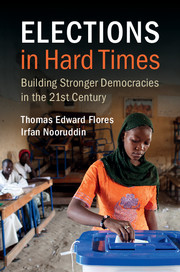Book contents
- Frontmatter
- Dedication
- Epigraph
- Contents
- List of figures
- List of tables
- Preface
- Part I From Elections to Democracy: Theory and Evidence
- 1 Introduction
- 2 Why Have Elections Failed to Deliver? An Answer
- 3 The Third Wave(s) and the Electoral Boom
- Part II Challenges Facing Elections in Developing Countries
- Part III Democracy Promotion for the Twenty-first Century
- Appendix A Data Appendix: Sample, Variables, Sources
- Appendix B Main Statistical Results
- Notes
- Bibliography
- Index
3 - The Third Wave(s) and the Electoral Boom
from Part I - From Elections to Democracy: Theory and Evidence
Published online by Cambridge University Press: 05 September 2016
- Frontmatter
- Dedication
- Epigraph
- Contents
- List of figures
- List of tables
- Preface
- Part I From Elections to Democracy: Theory and Evidence
- 1 Introduction
- 2 Why Have Elections Failed to Deliver? An Answer
- 3 The Third Wave(s) and the Electoral Boom
- Part II Challenges Facing Elections in Developing Countries
- Part III Democracy Promotion for the Twenty-first Century
- Appendix A Data Appendix: Sample, Variables, Sources
- Appendix B Main Statistical Results
- Notes
- Bibliography
- Index
Summary
We are confronted with a troubling fact: the democratic dividend from elections declined just as they became globally de rigueur and improved dramatically in competitiveness. Our explanation for this democratic decline relies heavily on the differing structural contexts in which elections take place. Some election winners inherit relatively deep stocks of what we call performance and democratic-institutional legitimacy from their predecessors; others do not. Leaders are more likely to perform in office in a manner that promotes democratic change when they inherit relatively deeper stocks. Countries run the risk of becoming entangled in a low-legitimacy trap, in which even transparent elections yield governments whose road to re-election relies on corruption and weakening democratic rule, thus disillusioning voters and lowering the integrity of future elections. We theorize that elections are more likely to promote democracy where there is a previous history of democratic rule, fiscal space is relatively ample, and the country is at peace.
Our theory operates at the election level, predicting which elections will be more successful in promoting democracy. If the theory holds water, we should observe that the global decline in the democratic dividend from elections after 1988 coincided with a similar decline in the structural circumstances in which the elections took place. That is, our theory makes predictions not only about particular elections, but also about time. If elections have generated virtually no democratic dividend since the dawn of the electoral boom, it is because those elections have been held in countries with less democratic experience, less fiscal space, and a more recent history of violent conflict than the countries in which elections were held before the electoral boom.
In this chapter, we unfold a short history of elections since 1946 that confirms this expectation. At first glance, this explanation seems unbelievable. After all, have we not witnessed major development gains from Latin America to South Asia over the last sixty years? The answer to this puzzle lies in examining which countries have begun to hold elections. Three major geopolitical and economic shocks that pre-dated the electoral boom played an important role in defining the structural context in which elections took place: decolonization between 1946 and 1977, the global debt crisis of the 1970s and 1980s, and the denouement of the Cold War in the late 1980s and early 1990s.
- Type
- Chapter
- Information
- Elections in Hard TimesBuilding Stronger Democracies in the 21st Century, pp. 57 - 78Publisher: Cambridge University PressPrint publication year: 2016



